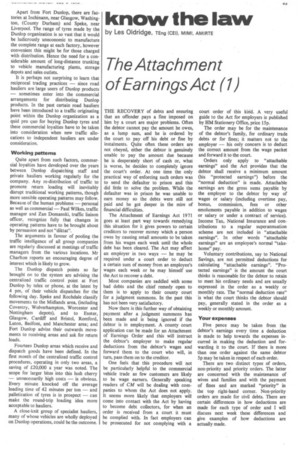know the law
Page 85

If you've noticed an error in this article please click here to report it so we can fix it.
by Les Oldridge, TEng (CEO, MIMI. AMIRTE
The Attachment of Earnings Act (1)
THE RECOVERY of debts and ensuring that an offender pays a fine imposed on him by a court are major problems. Often the debtor cannot pay the amount he owes, as a lump sum, and he is ordered by the court to pay off his debt or fine by instalments. Quite often these orders are not obeyed, either the debtor is genuinely unable to pay the amount due because he is desperately short of cash or, what is worse, he decides to completely ignore the court's order. At one time the only practical way of enforcing such orders was to send the defaulter to prison and this did little to solve the problem. While the defaulter was in prison he was unable to earn money so the debts were still not paid and he got deeper in the mire of financial difficulties.
The Attachment of Earnings Act 1971 goes at least part way towards remedying this situation for it gives powers to certain creditors to recover money which a person owes by causing small amounts to be taken from his wages each week until the whole debt has been cleared. The Act may affect an employer in two ways — he may be required under a court order to deduct a certain sum of money from an employee's wages each week or he may himself use the Act to recover a debt.
Most companies are saddled with some bad debts and the chief remedy open to them is to apply to their county court for a judgment summons. In the past this has not been very satisfactory.
Now there is this further way of obtaining payment after a judgment summons has been made and is being ignored if the debtor is in employment. A county court application can be made for an Attachment of Earnings Order and this will instruct the debtor's employer to make regular deductions from the debtor's wages and forward them to the court who will, in turn, pass them on to the creditor.
One feels that this procedure will not be particularly helpful to the commercial vehicle trade as few customers are likely to be wage earners. Generally speaking readers of CM will be dealing with companies to whom the Act does not apply. It seems more likely that employers will come into contact with the Act by having to become debt collectors, for when an order is received from a court it must be complied with. In fact employers can be prosecuted for not complying with a court order of this kind. A very useful guide to the Act for employers is published by HM Stationery Office, price 15p.
The order may be for the maintenance of the debtor's family, for ordinary trade debts or for fines; it matters not to the employer — his only concern is to deduct the correct amount from the wage packet and forward it to the court.
Orders only apply to "attachable earnings" and the Act provides that the debtor shall receive a minimum amount (his "protected earnings") before the "normal deduction" is made. Attachable earnings are the gross sums payable by the employer to the debtor by way of wages or salary (including overtime pay, bonus, commission, fees or other emoluments payable in addition to wages or salary or under a contract of service). Income Tax, National Insurance and contributions to a regular superannuation scheme are not included in "attachable earnings". In other words "attachable earnings" are an employee's normal "takehome" pay.
Voluntary contributions, say to National Savings, are not permitted deductions for calculating "attachable earnings". "Protected earnings" is the amount the court thinks is reasonable for the debtor to retain to meet his ordinary needs and are usually expressed in the order as a weekly or monthly rate. The "normal deduction rate" is what the court thinks the debtor should pay, generally stated in the order as a weekly or monthly amount.
Your expenses
Five pence may be taken from the debtor's earnings every time a deduction is made to help towards the expenses incurred in making the deduction and forwarding it to the court. If there is more than one order against the same debtor 5p may be taken in respect of each order.
There are two distinct types of orders, non-priority and priority orders. The latter are concerned with the maintenance of wives and families and with the payment of fines and are marked "priority" in the top right-hand corner. Non-priority orders are made for civil debts. There are certain differences in how deductions are made for each type of order and I will discuss next week these differences and give examples of how deductions are actually made.




























































































































































